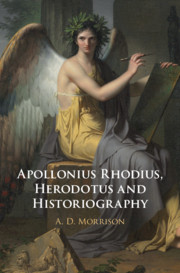Book contents
- Apollonius Rhodius, Herodotus and Historiography
- Apollonius Rhodius, Herodotus and Historiography
- Copyright page
- Dedication
- Contents
- Preface
- Abbreviations
- Introduction
- Chapter 1 Receiving Herodotus
- Chapter 2 Creating Authorities
- Chapter 3 Explaining the Past
- Chapter 4 Telling Stories
- Chapter 5 Greeks and Non-Greeks
- Chapter 6 Kings and Leaders
- Conclusions and Consequences
- Select Bibliography
- Index of Subjects
- Index of Passages
Conclusions and Consequences
Published online by Cambridge University Press: 13 January 2020
- Apollonius Rhodius, Herodotus and Historiography
- Apollonius Rhodius, Herodotus and Historiography
- Copyright page
- Dedication
- Contents
- Preface
- Abbreviations
- Introduction
- Chapter 1 Receiving Herodotus
- Chapter 2 Creating Authorities
- Chapter 3 Explaining the Past
- Chapter 4 Telling Stories
- Chapter 5 Greeks and Non-Greeks
- Chapter 6 Kings and Leaders
- Conclusions and Consequences
- Select Bibliography
- Index of Subjects
- Index of Passages
Summary
I have argued in this book that in the Argonautica we can see extensive and pervasive engagement with the genre of historiography, in particular with the Histories of Herodotus, which functions both as the modello-codice for historiographical discourse in general and as the particular modello-esemplare for a number of crucial passages in the epic. A good example of this double relationship is provided by the different ways in which Apollonius makes use of Herodotean ethnography, which is among the most distinctive (and influential) aspects of Herodotus’ historical writing. The Argonautica, I have suggested, views the mythological events of the heroic age which it narrates from an ethnographic perspective (quite different from the situation we find in the Homeric epics), in which the narrator explains the practices and customs of heroes such as Jason in a way strongly reminiscent of the kind of language used by Herodotus when explaining the nomoi of historical peoples (both Greek and non-Greek). Particular individual Herodotean descriptions of people, such as those of the Egyptians and Persians, are also engaged with directly by Apollonius in his portrayal of not only non-Greek peoples such as the Colchians, but also in his depiction of Greeks such as Jason. In part, as we have explored, the adoption of an ethnographic perspective and the engagement with particular ethnographies is a means for articulating the Argonautica’s distance from its epic modello-codice, Homer (especially the Odyssey).
- Type
- Chapter
- Information
- Apollonius Rhodius, Herodotus and Historiography , pp. 209 - 217Publisher: Cambridge University PressPrint publication year: 2020

